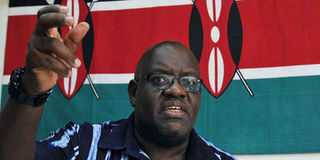Corruption in Kenya 'worse than ever' says veteran campaigner John Githongo

Kenyan veteran anti-corruption activist and whistle-blower John Githongo, 50, speaks during an interview in Nairobi on July 31, 2015. AFP PHOTO | SIMON MAINA
What you need to know:
- "Corruption in Kenya has deepened and widened," since President Uhuru Kenyatta came to power in 2013, he claimed.
- The government insists it is battling graft and Kenyatta has spoken out clearly and often against corruption, including during Obama's visit
- Paying bribes to police and bureaucrats remains routine for ordinary Kenyans, but Mr Githongo said the current level of corruption outstrips anything he has seen in a more than 20-year career battling graft.
NAIROBI
Corruption in Kenya is sliding out of control, veteran anti-corruption activist and whistle-blower John Githongo has warned in an interview following a scathing audit of government finances.
The comments also came after US President Barack Obama's visit to Kenya when he spoke of "the cancer of corruption".
The publication of an official audit found just one percent of Kenya government spending and a quarter of the entire $16 billion (15 billion euro) budget was properly accounted for.
"This is the most rapacious administration that we have ever had," said Mr Githongo.
"Corruption in Kenya has deepened and widened," since President Uhuru Kenyatta came to power in 2013, he claimed.
Apart from the Auditor-General's report, a series of scandals have emerged in the media concerning government procurement and land grabbing, perhaps the oldest trick in Kenya's corruption playbook.
The country is slipping down Transparency International's annual corruption index and is now 145th out of 174 nations, down from 136 in 2013. With media and civil society also under pressure the 50-year-old corruption fighter warned of "the speed with which democratic space is shrinking".
The government insists it is battling graft and Kenyatta has spoken out clearly and often against corruption, including during Obama's visit. Earlier this year a handful of ministers and other officials were suspended, but Mr Githongo said this was "lip service".
"There is a complete disconnect between what he says and what he does," he claimed, accusing Kenyatta and his deputy William Ruto of creating "the atmosphere in which civil servants, politicians and businessmen can engage in corruption on the kind of grand destructive scale we are seeing today."
In a speech to the Kenyan people last Sunday, Obama said, "Corruption is tolerated because that's how things have always been done".
Paying bribes to police and bureaucrats remains routine for ordinary Kenyans, but Mr Githongo said the current level of corruption outstrips anything he has seen in a more than 20-year career battling graft.
"The details come out in dribs and drabs, but it's clear we've reached a scale of looting that surpasses anything we've had in Kenyan history," he said.
CAPTURED BY CORRUPT ELITES
In 2002, Mr Githongo was appointed 'anti-corruption czar' by then president Mwai Kibaki, but three years later he fled for his life after uncovering a $770m (700 million euro) security procurement scam known as Anglo Leasing.
Mr Githongo's whistle-blower story became the basis of Michela Wrong's 2009 book It's Our Turn to Eat, a year after Githongo had returned home.
The earlier government of Daniel arap Moi, who ruled for 24 years until 2002, was defined by the $1 billion (900 million euro) gold subsidy fiddle known as Goldenberg.
More recently, Parliament has questioned the tendering behind the new $13.5 billion (12.4 billion euro) Mombasa-Nairobi railway line, a huge infrastructure project seen as essential to Kenya's economic growth.
Githongo said there are suspicions the railway was "from the very beginning... engineered as a corrupt project", while the Auditor-General had exposed "an environment of unprecedented permissiveness" for corruption.
"That only 1.2 per cent of government expenditure can be properly accounted for is a stinging indictment of the management of public resources. The entire system is either in a state of failure or has been captured by corrupt elites," he said.
On Thursday, Cabinet Secretary for Finance Henry Rotich shrugged off the 361-page auditor's report in a three-page statement that said his ministry "has since established that there were no resources lost". As with the government accounts, scant supporting evidence was provided.
Mr Githongo dismissed the recent, belated start of prosecutions in the Anglo-Leasing case as "a fig leaf" allowing Kenya to claim to be fighting corruption.
Nor was he impressed by the suspension of ministers, depicting the well-worn path of stepping aside, going to court and avoiding prosecution, as "a laundromat to cleanse their reputations and allow them to go back to public office".
"This administration isn't going to have one Goldenberg or one Anglo Leasing, we have got several going on at the same time in different departments," said Mr Githongo.





